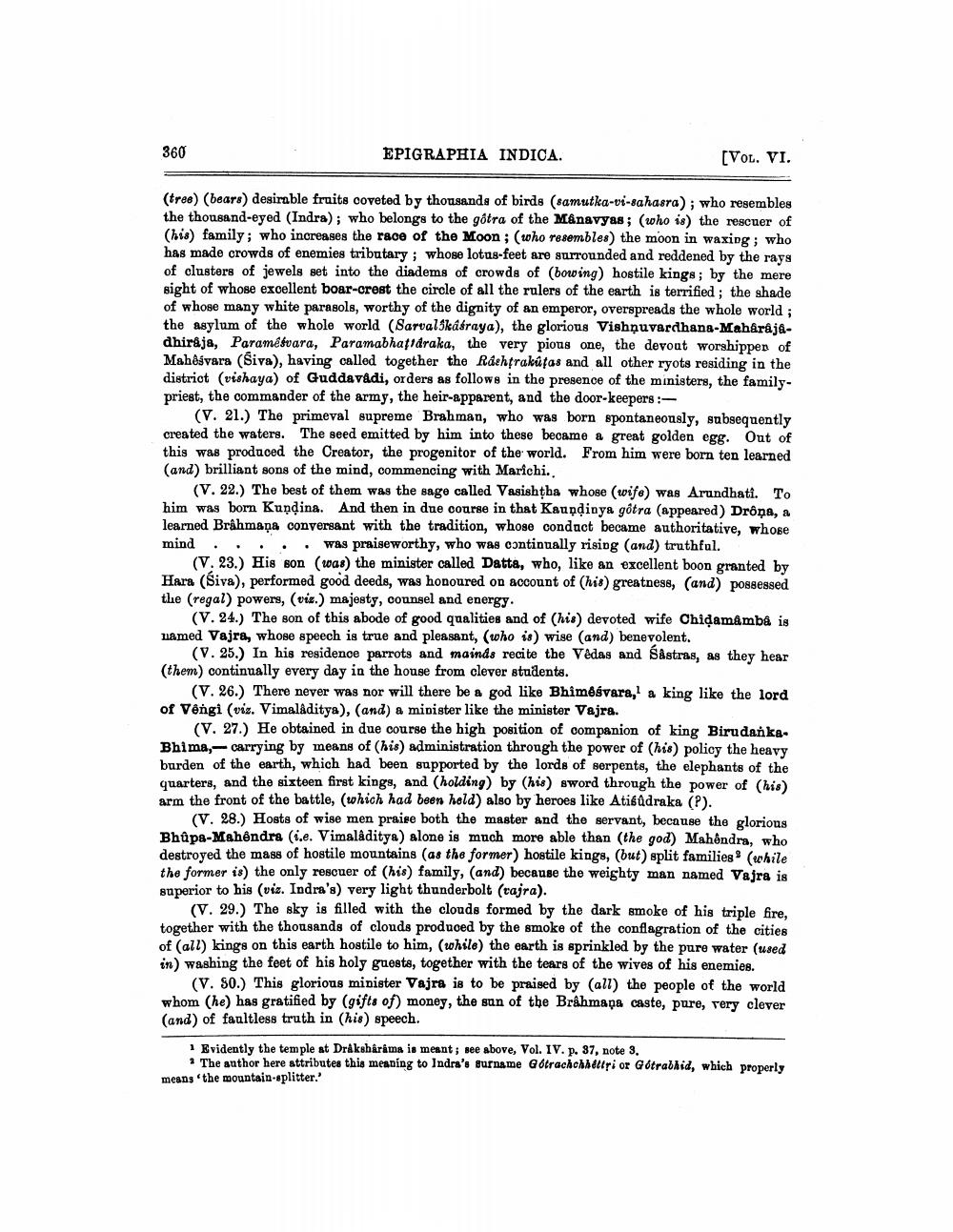________________
360
EPIGRAPHIA INDICA.
[Vol. VI.
(tree) (bears) desirable fruits coveted by thousands of birds (samutka-vi-sahasra); who resembles the thousand-eyed (Indra); who belongs to the gôtra of the Månavyas; (who is) the rescuer of (his) family; who increases the race of the Moon ; (who resembles) the moon in waxing; who has made crowds of enemies tributary ; whose lotas-feet are surrounded and reddened by the rays of clusters of jewels set into the diadems of crowds of (bowing) hostile kings; by the mere sight of whose excellent boar-crest the circle of all the rulers of the earth is terrified; the shade of whose many white parasols, worthy of the dignity of an emperor, overspreads the whole world ; the asylum of the whole world (Sarvalskáśraya), the glorious Vishņuvardhana-Maharajadhiraja, Paramédvara, Paramabhadraka, the very pious one, the devout worshipped of Maheśvara (Siva), having called together the Rashtrakůtas and all other ryots residing in the district (vishaya) of Guddavidi, orders as follows in the presence of the ministers, the familypriest, the commander of the army, the heir-apparent, and the door-keepers :
(V. 21.) The primeval supreme Brahman, who was born spontaneously, subsequently created the waters. The seed emitted by him into these became a great golden egg. Out of this was produced the Creator, the progenitor of the world. From him were born ten learned (and) brilliant sons of the mind, commencing with Marichi..
(V. 22.) The best of them was the sage called Vasishtha whose (wife) was Arundhati. To him was born Kundina. And then in due course in that Kauņdinya gôtra (appeared) Drôņa, a learned Brahmaņa conversant with the tradition, whose conduct became authoritative, whose mind . . . . . was praiseworthy, who was continually rising (and) truthful.
(V. 23.) His son (sas) the minister called Datta, who, like an excellent boon granted by Hara (Śiva), performed good deeds, was honoured on account of his greatness, (and) possessed the (regal) powers, (vix.) majesty, counsel and energy.
(V. 24.) The son of this abode of good qualities and of (his) devoted wife Chidamamba is named Vajra, whose speech is true and pleasant, (who is) wise (and) benevolent.
(V. 25.) In his residence parrots and mainds recite the Vedas and Sastras, as they hear (them) continually every day in the house from clever students.
(V. 26.) There never was nor will there be a god like Bhimêsvara, a king like the lord of Vengi (vis. VimalAditya), (and) a minister like the minister Vajra.
(V. 27.) He obtained in due course the high position of companion of king Biru dankaBhima, carrying by means of (his) administration through the power of (his) policy the heavy burden of the earth, which had been supported by the lords of serpents, the elephants of the quarters, and the sixteen first kings, and (holding) by (his) sword through the power of (his) arm the front of the battle, (which had been held) also by heroes like Atibûdraka (?).
(V. 28.) Hosts of wise men praise both the master and the servant, because the glorious Bhûps-Mahendra (i.e. Vimaladitya) alone is much more able than the god) Mahendra, who destroyed the mass of hostile mountains (as the former) hostile kings, (but) split families' (while the former is) the only rescuer of his family, (and) because the weighty man named Vajra is superior to his (vis. Indra's) very light thunderbolt (vajra).
(V. 29.) The sky is filled with the clouds formed by the dark smoke of his triple fire, together with the thousands of clouds produced by the smoke of the conflagration of the cities of (all) kings on this earth hostile to him, (while) the earth is sprinkled by the pure water (used in) washing the feet of his holy guests, together with the tears of the wives of his enemies.
(V. So.) This glorious minister Vajra is to be praised by (all) the people of the world whom (he) has gratified by (gifts of) money, the sun of the Brahmana caste, pure, very clever (and) of faultless truth in (his) speech.
1 Evidently the temple at Draksharima is meant; see above, Vol. IV. p. 37, note 3.
? The author here attributes this meaning to Indra's surname Gotrachchhaltri or Gótrabhid, which properly means "the mountain-splitter.'




